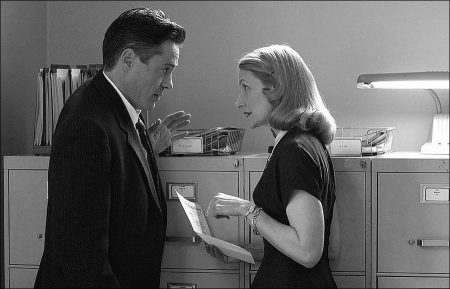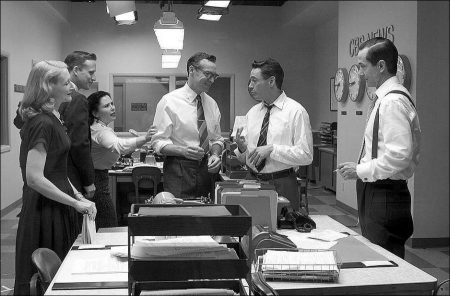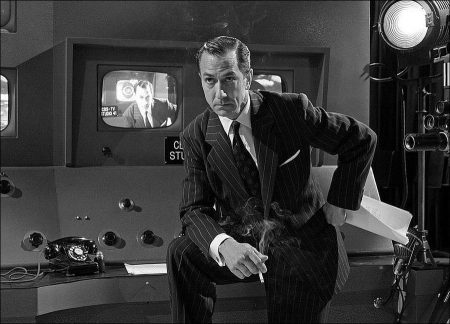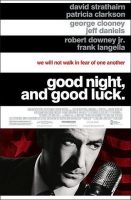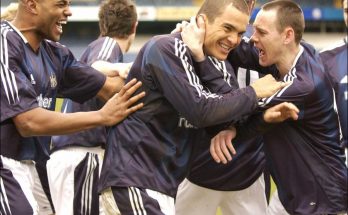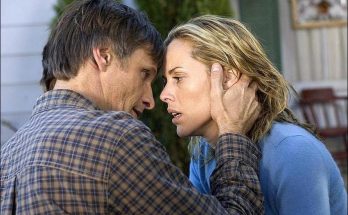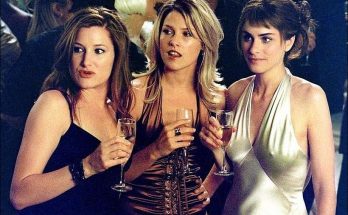Tagline: In a nation terrorized by its own government, one man dared to tell the truth.
In the mid-1950’s Edward R. Murrow and his producer, Fred Friendly, help bring an end to the tyranny of the blacklist and the House Un-American Activities Committee’s anti-Communist hearings. With the platform provided by his CBS News program “See It Now,” Murrow challenges Joseph McCarthy on his claims that hundreds of avowed Communists are working covertly as Soviet spies in the U.S. government, among other allegations, and that they have the power to destroy lives and careers.
“Good Night. And, Good Luck.” takes place during the early days of broadcast journalism in 1950’s America. It chronicles the real-life conflict between television newsman Edward R. Murrow and Senator Joseph McCarthy and the House Un-American Activities Committee.
With a desire to report the facts and enlighten the public, Murrow, and his dedicated staff – headed by his producer Fred Friendly and Joe Wershba in the CBS newsroom – defy corporate and sponsorship pressures to examine the lies and scaremongering tactics perpetrated by McCarthy during his communist ‘witch-hunts’.
A very public feud develops when the Senator responds by accusing the anchor of being a communist. In this climate of fear and reprisal, the CBS crew carries on and their tenacity will prove historic and monumental.
The year is 1953, television is still in its infancy and the esteemed broadcast journalist, Edward R. Murrow (David Strathairn), anchors the popular news documentary show, “See it Now,” on CBS. Murrow, alongside producer Fred Friendly (George Clooney), oversees a show that reports on the news items of the day. He also hosts the talk show “Person to Person,” yet “the face of television” is happiest as a news reporter.
The CBS TV newsroom is a constant hive of activity with secretaries typing, AP and UPI wires clicking away and the bustling of camera crews. Murrow has a dedicated crew of reporters that includes Don Hewitt (Grant Heslov), Joe Wershba (Robert Downey Jr.), Palmer Williams (Tom McCarthy), Jesse Zousmer (Tate Donovan), John Aaron (Reed Diamond), Charlie Mack (Robert John Burke) and Eddie Scott (Matt Ross). All these men will become broadcast legends, but right now, their careers are just beginning. They get together to screen the various topics of the day and discuss potential stories.
One such story is that of navy pilot, Milo Radulovich, who has been kicked out of the navy for being a security risk. Declared guilty without a trial, he had been asked to denounce his father and sister to stay on, but he refused. All charges against him have been kept sealed. Murrow reports this on the show despite opposition from the number two at CBS, Sig Mickelson (Jeff Daniels), who fears he may be getting the show into hot water. Murrow and Friendly are so committed to the program they even decide to pay for the advertising revenue lost from the show’s sponsors that have military contacts.
A powerful figure at the time is Senator Joseph McCarthy of Wisconsin, on a singular crusade to rid the country of communists. His relentless pursuit of anyone he feels may have connections to the communist party has allowed a sense of paranoia to seep into the public consciousness. Such is the reach of his power that people from the armed services to the creative community are forced to quit their jobs and go into exile based on his attacks.
Murrow suspects that McCarthy may have had something to do with Radulovich’s dismissal and worries that his closed hearings and theatrical vitriol both hide the fact that he has no real proof and are eroding people’s civil liberties. The Radulovich show airs and prompts an indirect response from McCarthy. Sure enough, because of Murrow’s questioning and probing of the case, he is accused of being a communist sympathizer. The anchor knows in his heart that it is all lies purely designed to scare his team away.
The McCarthy show airs and Murrow’s editorial both at the beginning and the end of the show is nothing short of brilliant. He manages to highlight the issues involved in the McCarthy hearings: namely, line between investigation and ‘persecution’; that dissent is not disloyalty; accusation is not proof; conviction depends upon evidence and due process of law; and finally, as defenders of freedom abroad, the US cannot desert it at home.
What’s more, rather than direct attack, McCarthy is only seen and heard in the context of using his own words, all of which seems to exemplify all of the above problems. Critics hail it as a masterpiece of crusading journalism and high responsibility not often found in television. For now, the knowledge of McCarthy’s tactics is out in the public domain and Murrow is safe.
Suddenly, Radulovich is reinstated yet McCarthy’s theatrical hearings continue, still spouting accusations at people based on hearsay. The show reports on the hearings of Annie Lee Moss whereby Senator McClellan insists they, McCarthy and aide Roy Cohn, supply him the corroborative evidence labeled against her. The public gets to witness how secretive, even flimsy, the accusations are.
Murrow invites McCarthy onto the show to respond. The Senator agrees but his rebuttal will be pre-filmed and he will need time to prepare. Eventually it airs, and predictably, he continues to accuse Murrow of communist ties without addressing any of the accusations leveled against him. Evidently, if he were to take issue with the factual content of the show itself, he would undermine his own words. Murrow details this in the following week’s broadcast and clears his character, once again denying any involvement with the communist party, feeling that his search for the truth, even if it means the attentions of McCarthy, is worth it. Again, the Senator gets a critical drubbing from the press and sees favorable opinion polls waver.
The show has captured, in the mind of the public, the spite of McCarthy highlighted by the insidiousness of his investigative tactics. With this spotlight in place, the Senate begins to take steps to censure the senator and vote him off as chairman of the committee.
For Murrow, his pioneering show and its news department, was what defined CBS. Yet, the show was moved out of its weekly slot to Sunday and only five more episodes were ordered. Paley sited the changing of the times and how it was entertainment that people wanted from their TV those days. Still, the legacy of Murrow’s show is one of pioneering investigative journalism. Whether it was an exposé on such topics as segregation, apartheid, the exploitation of migrant workers or the famous conflict with Senator Joseph McCarthy, Murrow would go on to influence generations to come.
“We will not walk in fear, one of another. We will not be driven by fear into an age of unreason, if we dig deep in our history and our doctrine; and remember that we are not descended from fearful men. Not from men who feared to write, to speak, to associate, and to defend causes that were for the moment unpopular.
This is no time for men who oppose Senator McCarthy’s methods to keep silent, or for those who approve. We can deny our heritage and our history, but we cannot escape responsibility for the result. There is no way for a citizen of a republic to abdicate his responsibilities. As a nation we have come into our full inheritance at a tender age. We proclaim ourselves, as indeed we are, the defenders of freedom, wherever it continues to exist in the world, but we cannot defend freedom abroad by deserting it at home.
The actions of the junior Senator from Wisconsin have caused alarm and dismay amongst our allies abroad, and given considerable comfort to our enemies. And whose fault is that? Not really his. He didn’t create this situation of fear; he merely exploited it — and rather successfully. Cassius was right. “The fault, dear Brutus, is not in our stars, but in ourselves.” Good night, and good luck.” – See it Now broadcast, March 9, 1954
Good Night, and Good Luck. (2005)
Directed by: George Clooney
Starring: David Strathairn, George Clooney, Robert Downey Jr., Patricia Clarkson, Jeff Daniels, Tate Donovan, Frank Langella, Rosa Abdoo, Dianne Reeves, Alex Borstein
Screenplay by: George Clooney, Grant Heslov
Production Design by: James D. Bissell
Cinematography by: Robert Elswit
Film Editing by: Stephen Mirrione
Costume Design by: Louise Frogley
Set Decoration by: Jan Pascale
Art Direction by: Christa Munro
Music by: Jim Papoulis
MPAA Rating: PG for mild thematic elements and brief language.
Distributed by: Warner Bros. Pictures
Release Date: October 7, 2005
Visits: 44
